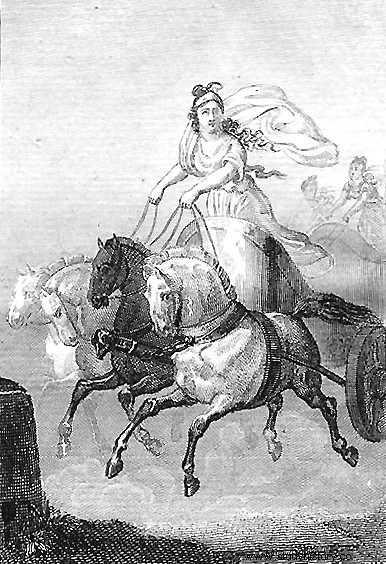Princess of Sparta, Cynisca (born around 440 BC) is in 396 BC. JC the first woman to win a victory at the ancient Olympic Games... without setting foot in the stadium!
Ancient women and sport

In ancient societies, even strongly patriarchal ones like ancient Greece or Rome, we find traces of young girls or women practicing physical exercises or leisure sports, ball games, horse riding, archery or even martial arts. . In ancient Greece, sports competitions were thus organized by women for women:the Heraia, held every four years in Olympia in honor of the goddess Hera, allowed young unmarried girls to compete against each other. others during stadion – running events. Dressed in a chiton cut above the knees and revealing the breast and right shoulder, the parthenoi (young girls) run an Olympic stadium distance reduced by one-sixth.
The existence of physical activities practiced by young girls and women during Antiquity does not, of course, indicate equal access to sport. Ancient societies were, for the most part, strongly patriarchal, and the gender roles assigned to women and men induce a different relationship to the world, to leisure and to the body. Thus, in Greece, participation in the Olympic Games is not only prohibited for women, but they are also forbidden to attend, on pain of death. Pausanias reports the case of a woman, and only one, having escaped the supreme punishment:at the V e century BC. JC, Kallipáteira, daughter, sister, wife and mother of athletes, transgresses the rule to witness a victory for her son. Discovered, she is not punished out of consideration for the athletes of her family.
Under these conditions, it seems difficult to imagine a woman winning an Olympic victory. Yet this is the feat accomplished by Cynisca, daughter of the king of Sparta Archidamos II, in 396 BC. J.-C. … without setting foot in the stadium!
"The only-woman-in-all-greece-to-win-this-crown"
The origin of Cynisca, princess of Sparta, plays a big role in this feat. Spartan women indeed enjoy greater freedoms and better education than Greek women. Destined, too, to give birth to robust children, they are required to maintain a good physical condition and a healthy diet. Married later than their neighbours, the young girls practiced various sports including horse riding, running, wrestling or even discus and javelin throwing. Daughter of a king, Cynisca is no exception to the rule, quite the contrary:considered a "tomboy", she fell in love with horse riding and was recognized as a talented rider.
However, the equestrian events of the Olympic Games crown the owners of the horses, and not the rider. Nothing therefore prevents Cynisca from showing up. Encouraged by her brother Agesilaus II, perhaps because the latter wants to discredit this sport by showing that it is enough to have mounts, Cynisca trains horses and riders, and aligns a team at the Olympic Games of -396, for the four-horse chariot race. His team wins, and will successfully defend their title four years later. Cynisca can neither attend the race nor receive her prize in person, but she still makes history as the first woman to win a victory in these Olympic Games so resolutely male. She receives the honors:a monument is dedicated to her in Sparta, in the grove of plane trees, where no other woman had yet had this privilege, while a statue representing her with a charioteer is erected in the temple of Zeus at Olympia. The inscription engraved on it reveals the pride of having been the first to obtain this title:
“The kings of Sparta are my fathers and brothers
Cyniska, winner of the chariot race with fast horses
Have erected this statue. I declare that I am the only woman
From all of Greece to have won this crown. »
The only one, at the time of her feat. Cynisca paves the way for other women, victorious chariot races during the Olympic Games. History remembers the names, for example, of Timareta and Theodota. Less famous, but also pioneers of this place that women will have such a hard time snatching from within this high mass of sport that is the Olympic Games.
